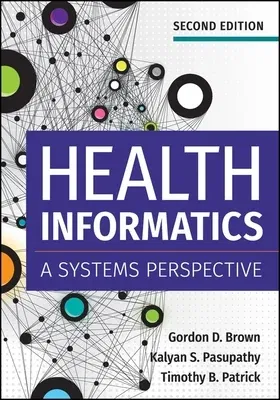Instructor Resources: Authors' responses to the chapter and case
study discussion questions; guidance on how the case studies may be
used; PowerPoint slides of the exhibits to supplement classroom
discussions and lectures; and suggested activities for exploring chapter
topics, including data sets. As the reach and influence of technology
grow, the world becomes increasingly connected. What happens in one
system--finance, manufacturing, research, infrastructure, supply chain,
and many more--can have a significant impact on the activities and
outcomes in other systems. Healthcare is no exception. Connecting all of
these systems is vital in order to properly support clinical care.
Health informatics has the potential to align these interlocking systems
in a way that transforms clinical decision-making and healthcare
delivery to optimize overall system performance. Health Informatics: A
Systems Perspective takes a systems approach to leveraging information
in healthcare and enhancing providers' capabilities through the use of
technology and knowledge transfer. The book offers a conceptual
framework for aligning clinical decision processes with system
infrastructures, including information technology, organizational
design, financing, and evaluation. The book's contributors--all leading
academics and healthcare practitioners--balance theoretical viewpoints
with practical considerations. Case studies and informative sidebars
support theory with real-world applications, while learning objectives,
key concepts, and discussion questions facilitate learning and reinforce
content. A glossary, which defines the main concepts and key
terminologies presented in the text, provides a useful overview of the
material. Thoroughly updated and revised, the second edition includes
three new chapters on information systems in relation to population
health, global health systems, and alternative financial mechanisms and
their compatibility with innovative delivery models. Additional topics
include: The role of human resources and information technology in
healthcareKnowledge-based decision-makingTransforming clinical work
processesNursing informaticsPrecision medicineData and information
securityAn essential resource for students and practicing managers
alike, Health Informatics: A Systems Perspective explains how
information technology can enable the transformation of health
organizations to improve not only the quality of healthcare, but also
the health of individuals and populations.

